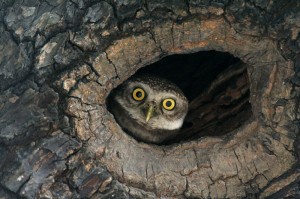Baby owls sleep "just like humans"

Author: Jonathan Warren
A recent study on the sleep patterns of baby owls has shown that their sleeping patterns are extremely similar to humans - a fact which may prove useful in studying the effects of sleep on the body.
The research, carried out at the University of Lausanne in Switzerland and the Max Planck Institute for Ornithology in Germany, used small sensors to detect body movements and brainwaves during the sleep of 66 owlets. Over five days, these sensors were able to determine results which show a surprising similarity between humans and owls in frequency of REM sleep, and confirmed that owls experience this type of sleep less as they grow older.
The research also revealed a link between sleep and melanin production in the nocturnal birds, suggesting that brain processes during sleep are related to the high frequency of melanism in adult owls.
 Baby owls sleep "just like humans"
Dr. Niels Rattenborg, a researcher at the Max Planck Institute, commented on the similarity, saying: "This naturally occurring variation in REM sleep during a period of brain development can be used to reveal exactly what REM sleep does for the developing brain in baby owls, as well as humans."
Baby owls sleep "just like humans"
Dr. Niels Rattenborg, a researcher at the Max Planck Institute, commented on the similarity, saying: "This naturally occurring variation in REM sleep during a period of brain development can be used to reveal exactly what REM sleep does for the developing brain in baby owls, as well as humans."
 Baby owls sleep "just like humans"
Dr. Niels Rattenborg, a researcher at the Max Planck Institute, commented on the similarity, saying: "This naturally occurring variation in REM sleep during a period of brain development can be used to reveal exactly what REM sleep does for the developing brain in baby owls, as well as humans."
Baby owls sleep "just like humans"
Dr. Niels Rattenborg, a researcher at the Max Planck Institute, commented on the similarity, saying: "This naturally occurring variation in REM sleep during a period of brain development can be used to reveal exactly what REM sleep does for the developing brain in baby owls, as well as humans."

